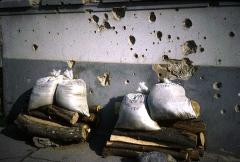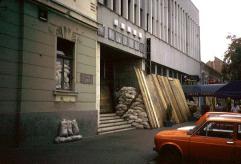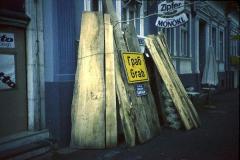Croatian Vacation
28 August 1995
"The United States Department of State warns U.S. citizens to avoid travel
to Croatia because of the potential for rapid deterioration of the security
situation there. In early August 1995 a number of cities were shelled
during a Croatian military offensive into the Serb-held Krajina region.
While fighting in that region has subsided, Croatian cities near Serb-held
areas of Bosnia and Croatia are still targeted by rebel Serb forces. These
include Debrovnik, Kutina, and Osijek. In the recently embattled areas,
mines, unexploded ordnance and bands of armed combatants pose risks to
travelers."
- US State Department Travel Advisory, August 18, 1995.
I just spent the last few days in Croatia. The most interesting part was
the day I spent in Osijek.
Osijek (the "j" is pronounced as "y") is not the kind of place you visit
without some planning. It's across the Drava River from Baranja, a
triangular piece of land bordered on the other two sides by Hungary and
Serbia, that is the last part of Croatia still occupied by Serbian
nationalists. I had been following the news for a while, and I knew there
hadn't been any fighting in that area for over a week. The political and
military situation made it seem unlikely that fighting would start again
soon.
The train was crowded with families, some with small children, who were
returning to Osijek after having left it when the fighting intensified five
weeks before. They apparently felt it was safe enough.
 When we arrived at Osijek, the first thing I noticed was that the train
station was heavily fortified. Every window was sandbagged and the glass
was taped. The entrances had sandbags and stacks of bricks arranged so that
you had to go through a switchback to get inside. In front of the sandbags
were thick wooden lean-tos, made of two-by-tens and propped against the
building. In front of this a line of box cars filled with bricks was parked
on the tracks next to the building. Passengers had to squeeze through a gap
in the box cars to get to the station.
When we arrived at Osijek, the first thing I noticed was that the train
station was heavily fortified. Every window was sandbagged and the glass
was taped. The entrances had sandbags and stacks of bricks arranged so that
you had to go through a switchback to get inside. In front of the sandbags
were thick wooden lean-tos, made of two-by-tens and propped against the
building. In front of this a line of box cars filled with bricks was parked
on the tracks next to the building. Passengers had to squeeze through a gap
in the box cars to get to the station.
I went through the station and out on to the street. The square was
deserted. A whole train full of people had simply evaporated. All the
other buildings were fortified like the station. All the window glass was
either broken, missing, or new. Every surface was pock-marked with
bullet or shrapnel holes.
Across the square was a building with a shot-out neon sign that had once
said "Hotel Turist." A line of machine-gun bullet holes was etched in to
the side of the building, climbing up to a vacant window. I missed the
sand-bagged entrance and went in through the bar.
I asked the desk clerk, Frank, whether it was safe to stay here. "Of
course," he replied. "There has been no shooting here for several days."
Reassured, I decided to take a room. Actually, I had little choice, since
there was no transportation out of town until morning.
Frank just laughed when I asked him if there was a bank in town where I
could change money, but the bartender offered to change some Deutschmarks.
There was also a young woman behind the desk who spoke perfect Australian
English. She had gone to high school in Sydney. Her father was in the
army. She showed me to the room. "But first," she said, "I'll show you
where to go if they start shooting."
 She took me through the kitchen to a small unmarked door. Stairs led
bottomlessly into the dark. "It's very safe," she assured me. "It was
built to withstand atom bombs."
She took me through the kitchen to a small unmarked door. Stairs led
bottomlessly into the dark. "It's very safe," she assured me. "It was
built to withstand atom bombs."
There were no other tourists at the Hotel Turist, just me and 56 refugees.
The Aussie girl had assumed I was a journalist. For some reason she became
much friendlier when I told her I was just a tourist.
I asked Frank where I could go for dinner, and he pointed out a few places
on the map. The Aussie girl traced out a route to one of them for me. When
I pointed out a more direct route, she said, "It's better for you if you go
this way." She also explained that everything closed at 7, except for a
pizzeria on the corner. "It's allowed to stay open late because it's
located in a basement bunker."
I opted for bunker pizza, then took a walk in to town. The streetcar was
running, and there were a few people out, mostly wearing camouflage fatigues
and carrying automatic weapons. The shops and movie theaters were mostly
closed, so I walked back to the hotel.
Just at dusk there was a tremendous thunderstorm, with lightning and heavy
rain. There wasn't much point in going back out anyway, so I went up to my
room. I noticed that my window was one of the few in town not sandbagged,
but it faced an inside courtyard. A pull cord in the bathroom was marked
"SOS." I was in bed by 9 but didn't fall asleep immediately. If the
shooting started, would I get a wakeup call? What does artillery sound
like?
In the morning the situation seemed much brighter, and having just been in
Salzburg, I whistled the tune to "My Favorite Things" on my way to
breakfast.
 Frank was still at the desk. He explained that they were on a war time
schedule, 24 hours on, 48 hours off. He was not accepted in to the army
because of glaucoma. He complained about the economic effects of the war,
how nobody could make any money with the fighting going on. He owns a house
in Dalmatia but can't sell it. Who would buy a house in a war zone?
Frank was still at the desk. He explained that they were on a war time
schedule, 24 hours on, 48 hours off. He was not accepted in to the army
because of glaucoma. He complained about the economic effects of the war,
how nobody could make any money with the fighting going on. He owns a house
in Dalmatia but can't sell it. Who would buy a house in a war zone?
The breakfast was delicious, the best I'd had in the Balkans so far.
After breakfast I rode the streetcar in to town and went for a walk by the
river. The Serbs were somewhere on the other bank. There was a bridge, but
no traffic. People were fishing in the river.
There was nothing to do in that town, so I left that morning. I've heard
that war consists mostly of boredom, and it's the parts that aren't boring
you have to watch out for. I'll admit to being relieved when the bus
crossed the border in to Hungary.
 Back to Travel and Culture.
Back to Travel and Culture.
Jim Rees
 When we arrived at Osijek, the first thing I noticed was that the train
station was heavily fortified. Every window was sandbagged and the glass
was taped. The entrances had sandbags and stacks of bricks arranged so that
you had to go through a switchback to get inside. In front of the sandbags
were thick wooden lean-tos, made of two-by-tens and propped against the
building. In front of this a line of box cars filled with bricks was parked
on the tracks next to the building. Passengers had to squeeze through a gap
in the box cars to get to the station.
When we arrived at Osijek, the first thing I noticed was that the train
station was heavily fortified. Every window was sandbagged and the glass
was taped. The entrances had sandbags and stacks of bricks arranged so that
you had to go through a switchback to get inside. In front of the sandbags
were thick wooden lean-tos, made of two-by-tens and propped against the
building. In front of this a line of box cars filled with bricks was parked
on the tracks next to the building. Passengers had to squeeze through a gap
in the box cars to get to the station.


